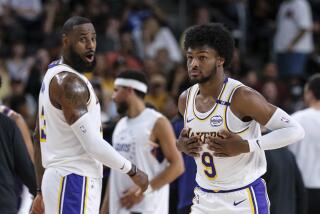LeBron James’ off-court moves are making him a major Hollywood player. How he does it
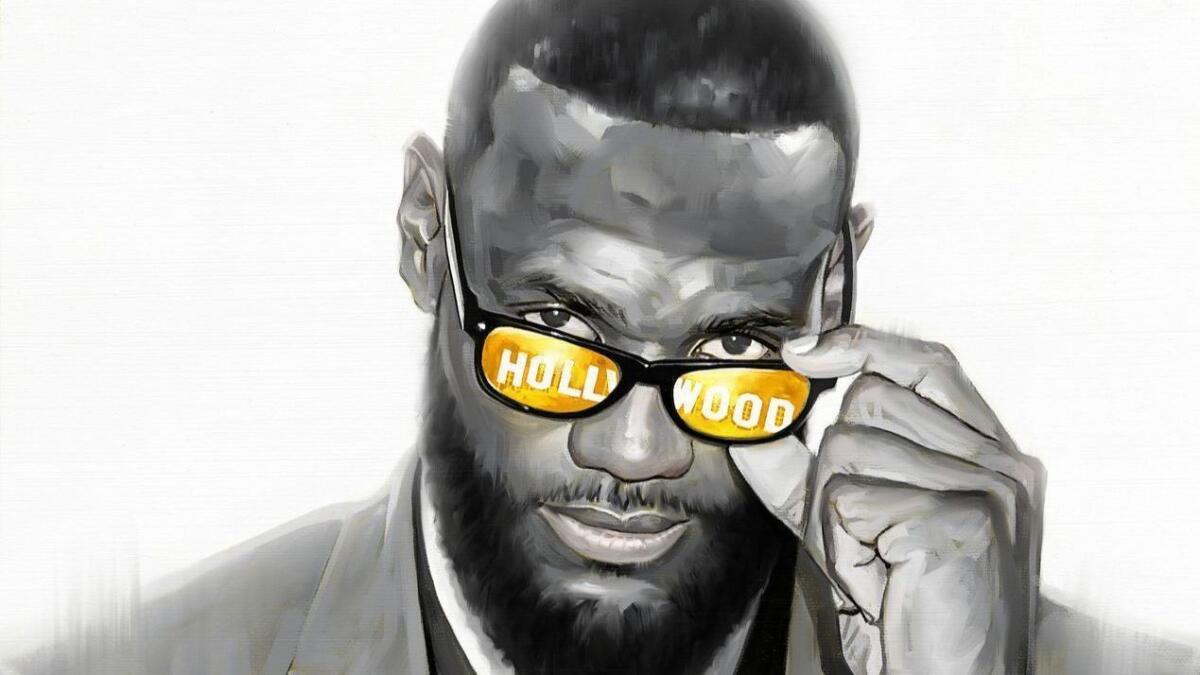
When LeBron James and his mother moved into the Spring Hill apartments in Akron, Ohio, it was the first time he had a room of his own. He was in sixth grade.
James and his mother had lived with his grandmother until she died of a heart attack at 42, and then with a series of friends, family members and generous neighbors, including a woman who noticed their heat wasn’t working and two different football coaches, one of whom introduced him to basketball. When he was in fourth grade, James and his mom moved so many times that he missed more than 80 days of school.
At Spring Hill, though, James found stability. In his sixth-floor bedroom, he found a place to dream.
“I always wanted something that I could look back and see where it all started from,” James says after a practice with the Lakers this winter.
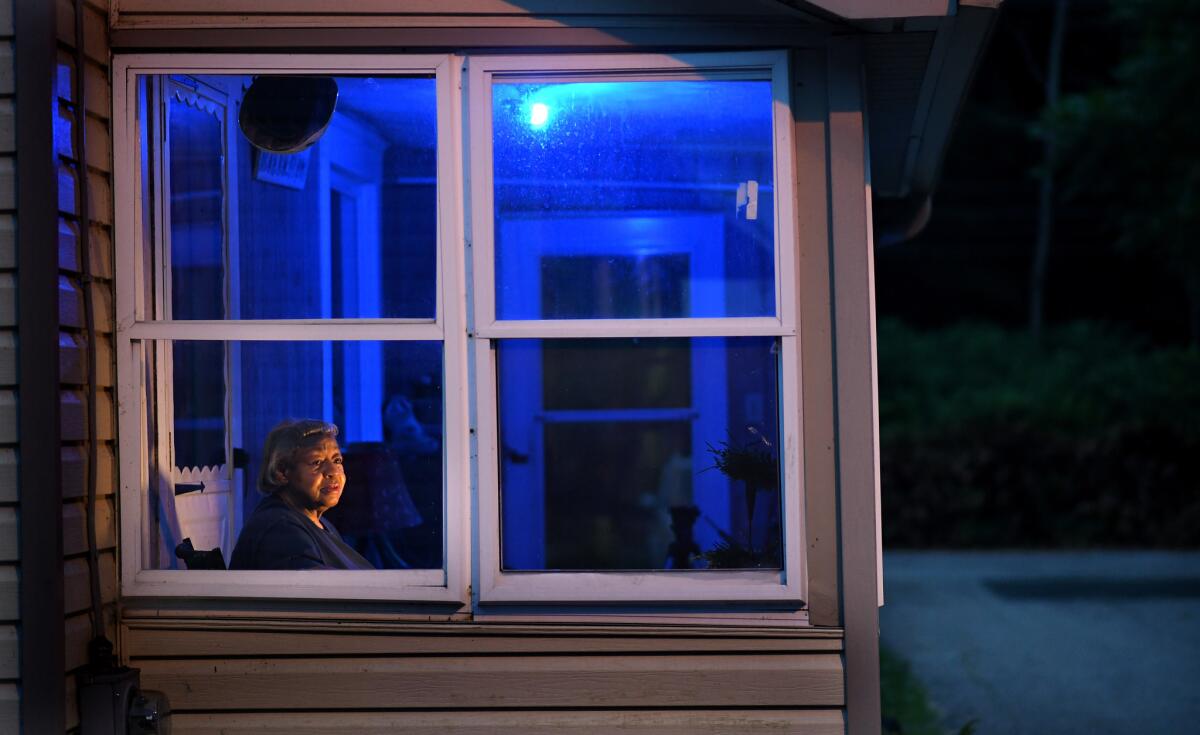
ALSO: Has LeBron James changed? Just ask the people of his hometown »
And so in 2008 he pushed the two words of that apartment complex together and created a company that served as a production vehicle for a documentary about his high school years, “More Than a Game.” SpringHill Entertainment was a safeguard against James losing ownership of his story. He didn’t know at the time that it would also become the vehicle for the NBA’s four-time MVP to become a major player in Hollywood.
Just over 10 years later, SpringHill Entertainment is not only behind the upcoming “Space Jam 2,” with James as its star and “Black Panther” director Ryan Coogler on board as a producer, it’s premiering the documentary “What’s My Name: Muhammad Ali,” directed by Antoine Fuqua (“Training Day,” “The Equalizer”) for HBO at the Tribeca Film Festival next month and has a full slate of scripted and unscripted series, as well as a remake of “House Party” in the works.
Earlier this month, the second season of James’ HBO interview show “The Shop,” which came out of his Uninterrupted digital platform, began. And this week saw the debut of the SpringHill-backed “Million Dollar Mile,” a new competition series for CBS hosted by Tim Tebow.
SpringHill is a production company that’s caught the eye of Hollywood like none other led by an active athlete. Kobe Bryant won his Oscar for the animated short “Dear Basketball” after his retirement. Warriors star Stephen Curry’s production company, Unanimous Media, signed a deal with Sony Pictures last year, but is still in its early stages. Curry’s teammate Kevin Durant has Thirty5 Media, which serves as its own platform for digital projects, the way James’ own digital platform Uninterrupted does. None matches the reach of SpringHill Entertainment.
Studios, networks and production companies all over town want to be in the LeBron James business. And not only for his screen presence — even though his performance in Amy Schumer’s “Trainwreck” was considered a revelation. He and his SpringHill team are very good for business (also, many Hollywood executives are LeBron fans).
“They’re whip-smart, cool people who have great taste,” says Mike O’Malley, the actor, director and writer who was the showrunner for “Survivor’s Remorse,” SpringHill’s basketball-centered sitcom, which ran for four seasons on Starz. “That’s why people want to work with them. It’s as simple as that.”
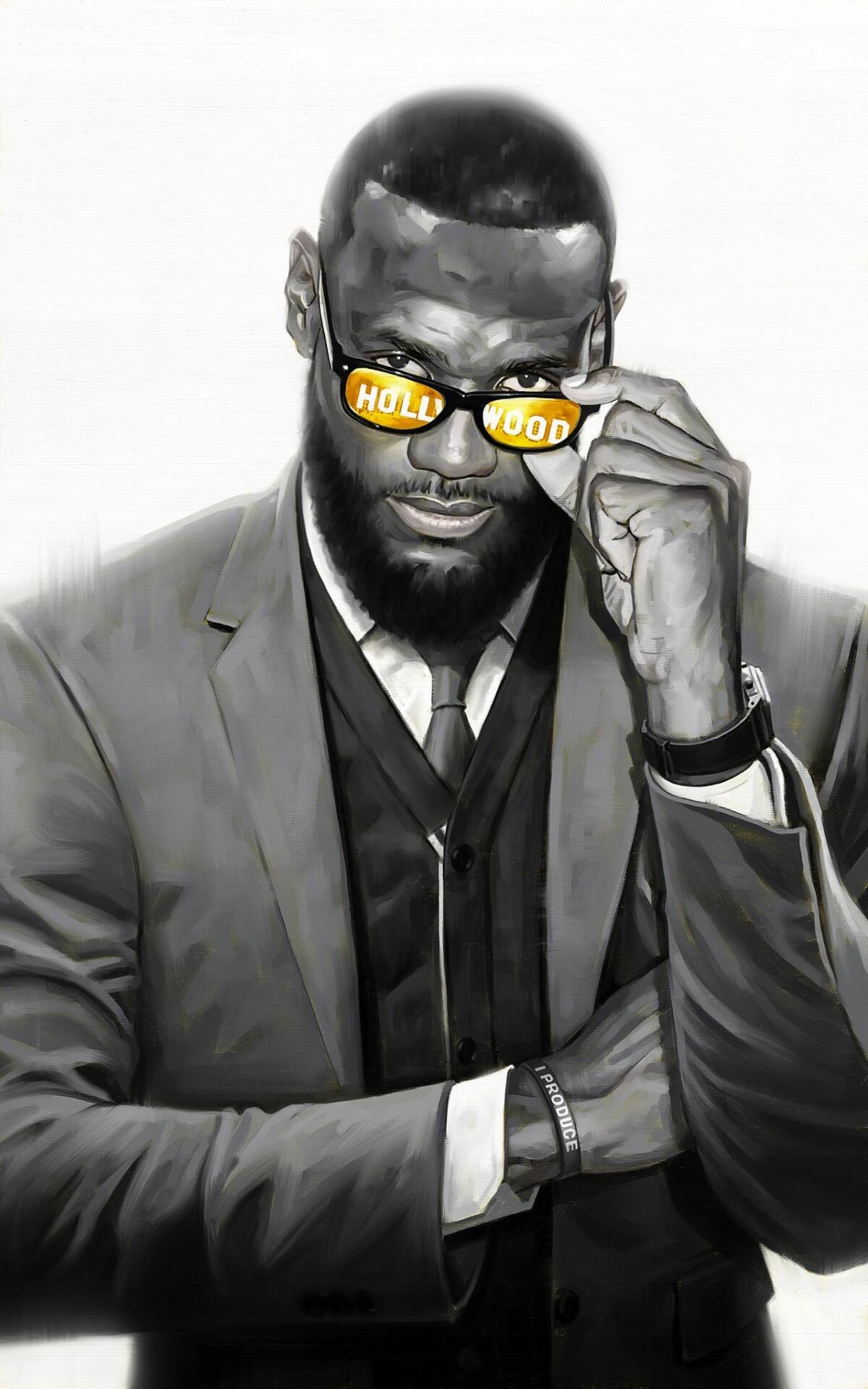
ALSO: A look at LeBron James’ longstanding Hollywood ties before he became a Laker »
That success has been a long time coming. For six years the company was essentially dormant after James started SpringHill and “More Than a Game” was produced. “Survivor’s Remorse” pulled it from hibernation.
Now SpringHill Entertainment lives its young adolescence in a charming two-story house on the Warner Bros. lot, complete with a kitchen, den, full bar and bike in the back (all the houses come with bikes). “Gilmore Girls” was filmed in this “neighborhood.” Tour groups ride by on elongated golf carts and see parking spaces out front that say “L. James” and “M. Carter.” Carter is Maverick Carter, who co-founded SpringHill Entertainment with James. He’s on the lot once or twice a week, James far less, mostly after basketball season.
“LeBron and I had a vision,” says Carter, who handles SpringHill’s daily operations. “That was it. There was no staff.”
Raised by a drug dealer father and a social worker mother, Carter met James in grade school, and the two grew close in high school. Carter was a senior and James a freshman. They became business partners early in James’ career, and eventually Carter negotiated James’ billion-dollar contract with Nike. “I never dreamed of being in Hollywood,” Carter says.
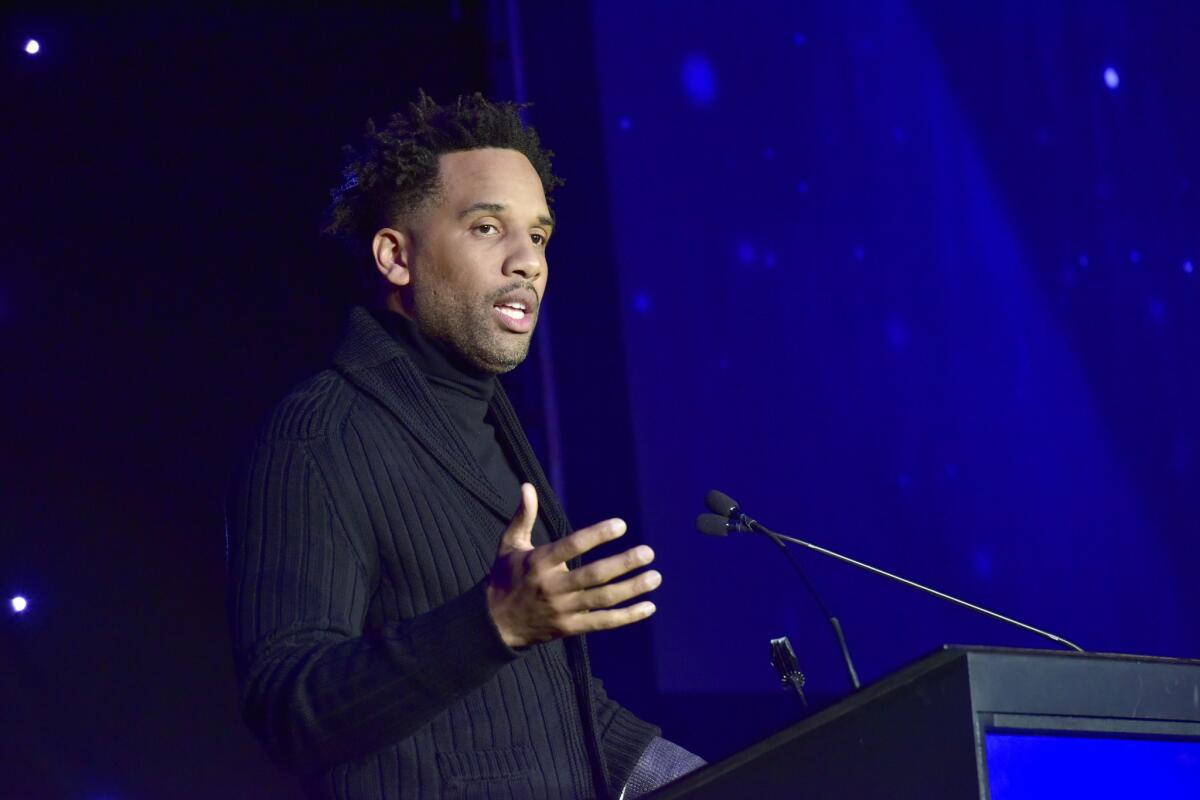
ALSO: LeBron James’ life takes him farther away from hometown, but his legacy only grows in Akron »
As for James, every time he sees the SpringHill logo — two white, mid-rise, rectangular apartment buildings against a black backdrop — he thinks back to his Akron days.
“For me to be able to look at my Spring Hill buildings every time there’s a production going on, and just think about 1180 Rentar Lane, Apartment 602. It’s pretty wild to be honest,” James says, his enthusiasm growing with each word as it does when he talks about anything that matters to him.
“It reminds me of where I come from, and how far I still want to go, and how many kids are living in those buildings right now and how far they want to go. So it’s my responsibility to try to make those buildings as tall as the sky.”
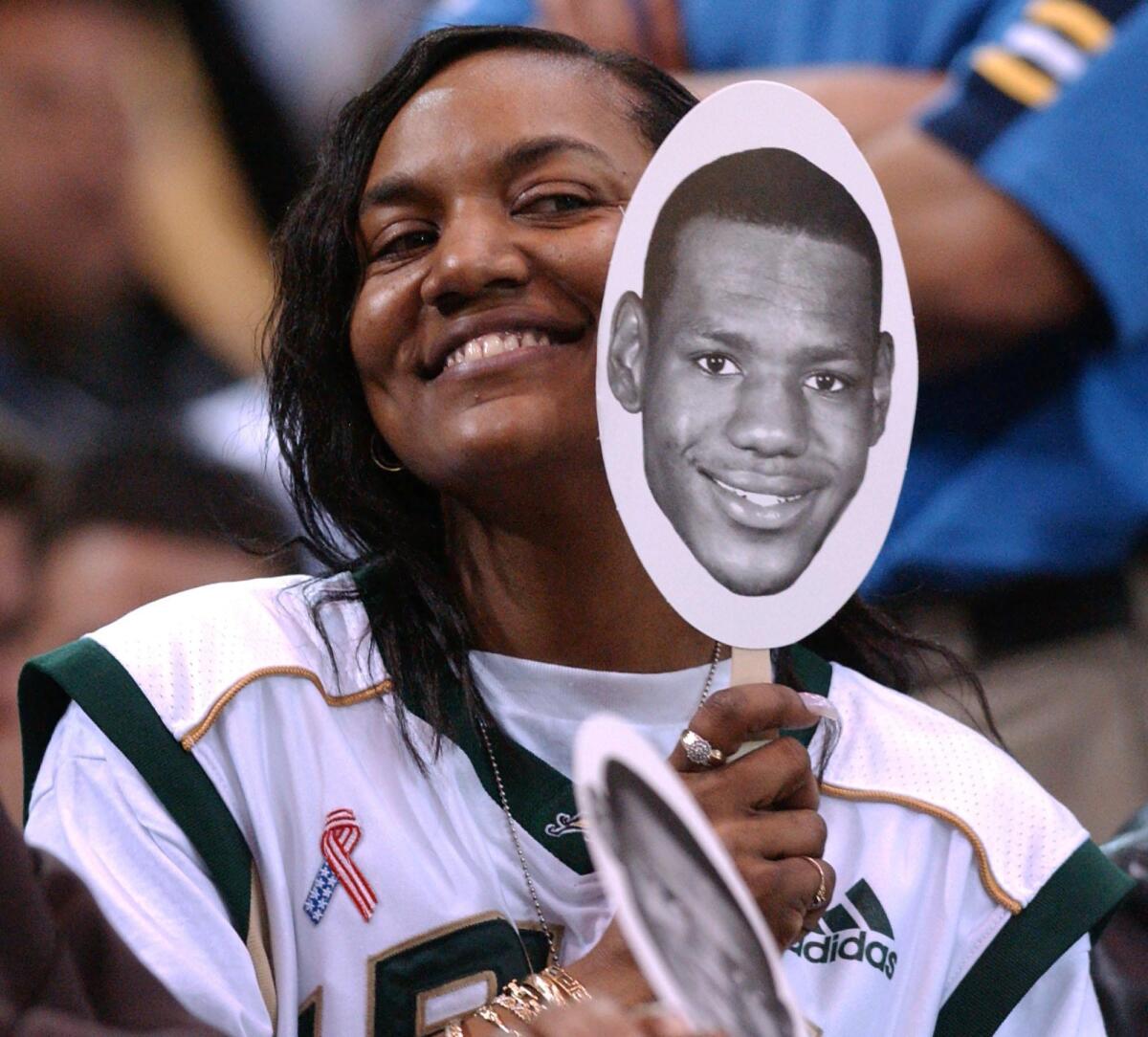
More than entertainment
What James cares about seeps from the pores of SpringHill Entertainment’s stories.
As an adult, he’s tried to learn as much as he can about black history, especially America’s civil rights period. Looking back, he says not nearly enough attention was paid to the subject in his classes when he was growing up.
“You hear about Martin Luther King, you hear about Booker T. Washington, you hear about Sojourner Truth and Rosa Parks, you hear about Malcolm X a little bit,” James says, stressing the word “little.” “But other than that they didn’t really preach it too much in school.”
Activism is part of James’ ethos. He brings it onto the court — while playing in Miami he wore a hoodie to protest the shooting death of unarmed black teenager Trayvon Martin, and wrote a message to Martin on his game shoes. He speaks about issues that matter to him, like racism and inequality, and his LeBron James Family Foundation does tangible work to help change his hometown. In July, the foundation helped open a public school in Akron, pouring millions into the project.
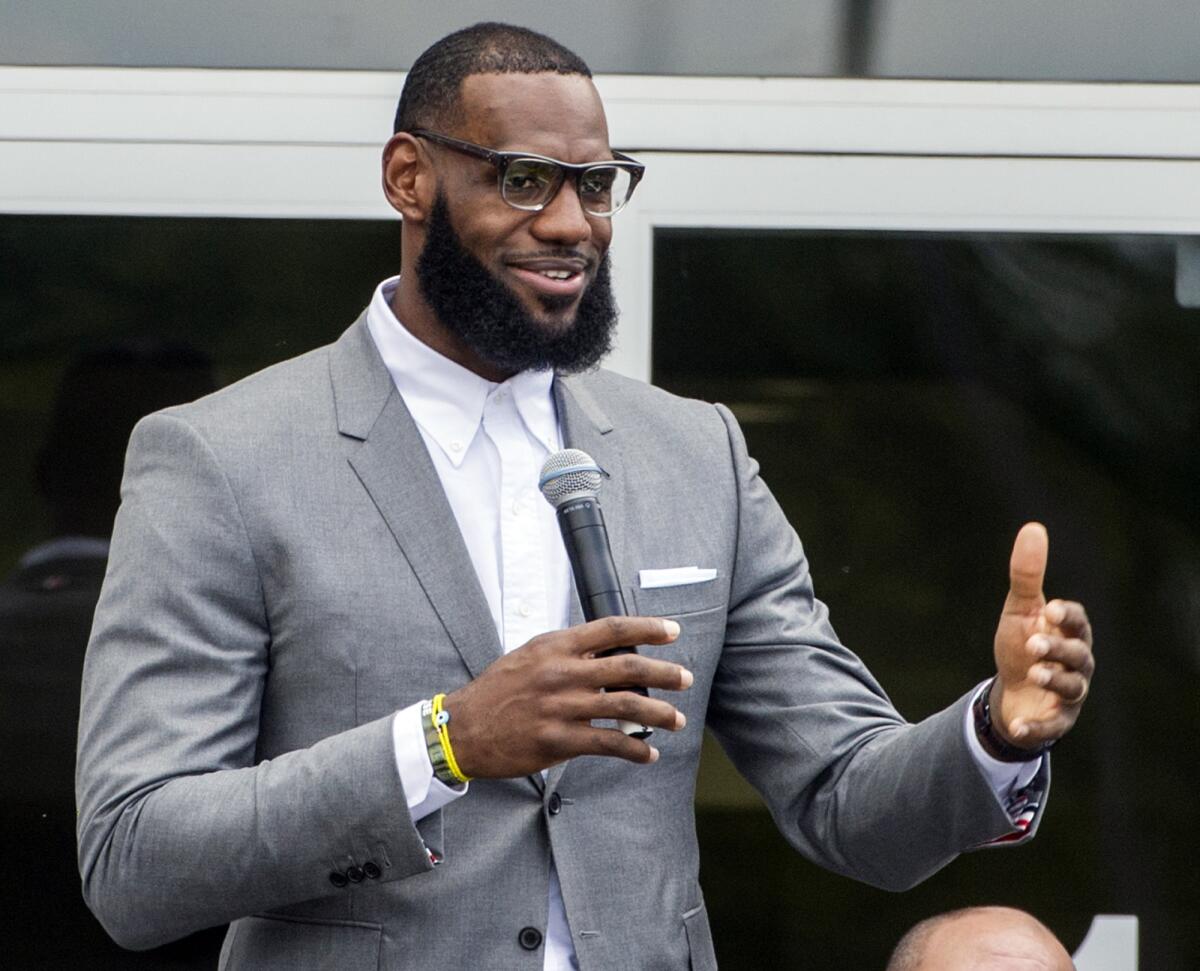
“LeBron’s voice as an activist is clearly mirrored in the documentary stories SpringHill looks to engage,” says Peter Nelson, an executive vice president of HBO sports.
Shortly after Fox News host Laura Ingraham suggested he “shut up and dribble” instead of criticizing President Trump, SpringHill announced a three-part documentary series for Showtime called “Shut Up and Dribble.” “Student Athlete,” which aired on HBO, sought to expose hypocrisies in the American system of college sports. “Rise Up,” a documentary about the civil rights movement, aired on the History Channel. “Warriors of Liberty City” on Starz explored a the crime-filled neighborhood that’s is a favorite for NFL recruiters. And the HBO documentary “What’s My Name: Muhammad Ali” uses the fighting champ’s own words to tell the story.
REVIEW: ‘Warriors of Liberty City’ offers an intimate look at an inner-city football program »
SpringHill is even trying to add a cultural element to “Space Jam 2,” leaning on the example Coogler set with “Black Panther.”
The company has also teamed up with Oscar winner Octavia Spencer to make a scripted limited series, “Madam C.J. Walker,” about Sarah Breedlove — a laundrywoman who rose to become a black hair-care entrepreneur with a company valued at more than $1 million by the time she died in 1919.
“It’s been the work he’s done off the court that’s been even more important to help build this business,” says SpringHill President Jamal Henderson, “because we are able to do things like ‘Madam C.J. Walker’ with Netflix. … They know where he stands on social issues. We’re able to do things like ‘Lean on Me’ because of the work he’s done for years.”
James says he and Carter didn’t plan to use their platform as a vehicle to tell underrepresented and activist stories, but they knew that plenty of those stories remain untold. They’re exciting for him to find too.
On court in Atlanta recently, hours before the Lakers played the Atlanta Hawks, James enthusiastically recounts the story of Madam C.J. Walker, saying, “No one even knows about that story. To be able to have a production company, to be able to put that together is pretty cool. We believe not only is it important for the African American community, it’s important for American history as well.”
In the game
Courtside celebrities are a common sight at Laker games. Denzel Washington, Will Ferrell, Jack Nicholson and Dyan Cannon are known home-game regulars, and in the weeks before the Oscars Rami Malek, Lucy Boynton, Mahershala Ali and Charlize Theron were all seen in premium seats. Carter is often in the mix too. Just this week, as the Lakers played the Wizards, he sat courtside next to former Disney and Dreamworks CEO Jeffrey Katzenberg, who has been making moves on his yet-to-launch mobile video streaming platform Quibi.
One February night, as the Lakers played the New Orleans Pelicans, Carter was in the same corner where Washington normally sits. At halftime, Adam Sandler, who had been seated next to the Lakers bench, made his way over to Carter, whose camouflage shirt had just the top button fixed. Carter held a drink in his right hand and wore a friendly expression as a series of courtside dignitaries approached for his time.
The Lakers won that night in part due to an off-balance, one-legged three-pointer James made late in the fourth quarter that sent the arena into a frenzy. Afterward, James greeted Carter in a hallway of the arena, tucked away from the rest of the fans. Both of them are just as comfortable in the bowels of a basketball arena as they are surrounded by Hollywood’s elite.
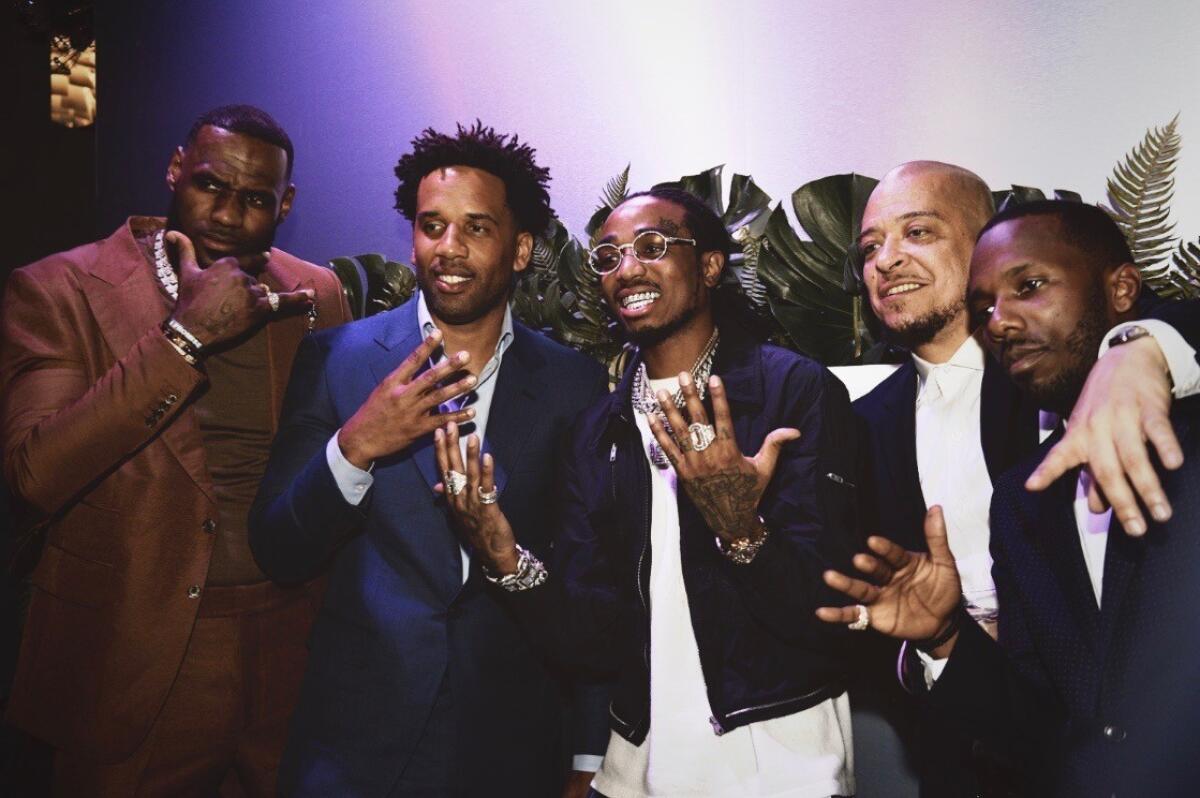
Their studio offices are on the second floor of SpringHill Entertainment’s two-story house. Two newspaper front pages hang on the wall of Carter’s office, announcing the Cavaliers’ first championship in 52 years — a championship that in some ways paved the way for James’ move to Los Angeles. Clevelanders were devastated and angry when James left the Cavaliers for Miami in 2010. Then he returned and won them a championship. When he left last summer, they weren’t angry anymore.
Like James, Carter grew up in Akron. Life wasn’t easy, but it was full of tales.
“I come from a big family where we tell big stories,” Carter says. “All we had was the storytelling.”
He remembers his father’s stories the best.
“Comedic storytelling,” Carter says. “Also very true and authentic. Doesn’t care that it may expose something about him that others may find embarrassing … he tells the truth.”
REVIEW: With ‘The Shop,’ LeBron James brings frank talk of race, politics and fame to HBO »
In the six years between SpringHill’s genesis and its first show, Carter and James developed contacts around the entertainment world. With their other two partners, childhood friends Randy Mims and Klutch Sports Group founder Rich Paul, they entered into business dealings with Tom Werner, the producer (“Roseanne,” “The Connors”), hedge-fund manager and chairman of the Boston Red Sox. Werner had seen a commercial that told the story of James’ life and saw the potential for something more. He called O’Malley, who had transitioned from acting (“Glee,” “Sully”) to writing and producing for “Shameless” and other projects. That meeting led to O’Malley becoming the showrunner for “Survivor’s Remorse,” about a young basketball player and his family and friends dealing with this sudden stardom.
“When I wrote the first draft, I got on the plane and I flew to Miami after a game — they had an off day,” O’Malley says. “We sat in LeBron’s house and read the script. LeBron, Randy, Savannah [James, LeBron’s wife] and Maverick they gave perspectives too.”
ALSO: The key to a great show is diversity. Just ask ‘Survivor’s Remorse’ creator Mike O’Malley »
Starz aired the first season of “Survivor’s Remorse” in 2014. It taught Carter what it takes for a production to go from idea to script to television series. He calls O’Malley a “genius” from whom he learned by example.
Working the odds
The game of basketball comes easy to James. He understands it better than nearly anyone alive. This is different.
Carter says he and James went into this venture knowing what they didn’t know. In this realm, the 15-time All-Star basketball player isn’t the main expert. But he’s surrounded himself with a strong team.
James and Carter’s partnership with Warner Bros. began in 2015 and they moved their offices to Warner Village not long afterward. Company president Henderson also has an office in the house, as do SpringHill’s heads of film (Spencer Beighley), unscripted (Phil Byron) and scripted (Eric Oberland) programming and creative development executive (Nicole Tossou).
Their offices have personal touches and white boards or blackboards covered in names, ideas, projects or tasks. Henderson’s board has about 40 different projects listed, some announced, others to be kept under wraps for now. Beighley’s is fully dedicated to “Space Jam 2” at the moment. The plan is to make the movie personal and authentic to James’ experience. A central question to the script’s theme: Why does LeBron play?
Their hope for every department is that about 25% of the work will focus on sports stories.
Only one out of 30 NBA teams will win a championship every year, but the odds are much worse for movie and television ideas. Only a small number of shows even get consideration from networks. Once past that hurdle, around 5% might make it to a full series. At SpringHill, they’re trying to better those odds by looking for the seeds of their projects inside and outside of Hollywood. Lately, more and more pitches are coming directly to their doors.
“I know it feels like we’re doing a million projects, but we’re mostly in the ‘no’ business,” Henderson says, as he sits on a pillow-adorned sectional couch in the company’s “pitch room.” It seems as if everyone in Los Angeles has a script in their trunk, he says, but quickly adds, “By the way, we’re super flattered to be in the mix.”
Free Hollywood agent
It takes about 15 minutes to drive up the 101 Freeway from SpringHill’s offices to Fly on the Wall Entertainment, the production company working with SpringHill on the competition show “Million Dollar Mile.” A shelf in the office of Rich Meehan, co-founder and co-CEO of the company that created the “Big Brother” franchise, could be described as a shrine to the Lakers. Figurines of James Worthy, Magic Johnson, several Kobe Bryants (it was a five-piece set), even Brandon Ingram and Lonzo Ball are perched on the shelf. They stand mid-shot, pass, dribble or jump, each about 5 or 6 inches tall.
For years Meehan and fellow co-founder and co-CEO Allison Grodner offered tours of the “Big Brother” set to Lakers co-owner Jeanie Buss, and welcomed her to tapings of the show. But their business with the Lakers didn’t go much beyond that, and in 2015, when Fly on the Wall hatched the idea for “Million Dollar Mile,” they wanted James involved — even if he played for the Cleveland Cavaliers.
“This was our dream to work with SpringHill and LeBron on this project,” Grodner says.
It took two more years before the work truly began after editing the idea into something workable. Together, they sold the idea that became “Million Dollar Mile” to CBS last year.
CBS had been interested in working with SpringHill for a while. Sharon Vuong, the network’s head of unscripted (and a Laker fan) says executives at the network appreciated the company’s vision. She met with Henderson when she ascended to her current role in 2017 to discuss working together on projects.
The landscape of unscripted television shows is so congested that it takes something special for a show to get noticed and survive. The marketing is so delicate that to avoid confusion CBS didn’t want an early name of the show that became “Million Dollar Mile” to be mentioned in this story.
Having James makes marketing a show much easier.
“Because of LeBron reaching out to his fans,” Vuong says, “we had the most applicants [for the first season of a show] since ‘Survivor.’”
James also filmed a promotional spot for the show at the Lakers facility in mid-January.
REVIEW: ‘Survivor’s Remorse’ bounces well off the comedy backboard »
And Meehan’s shelf today? Like many Lakers fans, he was desperate last summer for information about James’ future. He was set to become a free agent on July 1, and the Lakers were transparent about wanting to sign him.
Meehan pestered Byron for clues about whether James would be a Laker. Byron, who only recently learned who Cavalier Kevin Love is, got that a lot. (No, being a basketball nut isn’t a requirement at SpringHill.)
“I got no hints,” Meehan says.
James made his decision on the first day of free agency and then promptly left the country. Meehan also acted quickly and bought a new figurine for his shelf. He has his tickets from James’ first game as a Laker displayed there too.
The supposition, though, that James became a Laker because of his Hollywood aspirations annoys James. He was asked twice in his introductory press conference as a Laker about how he balances his time, and he responded to both questions curtly.
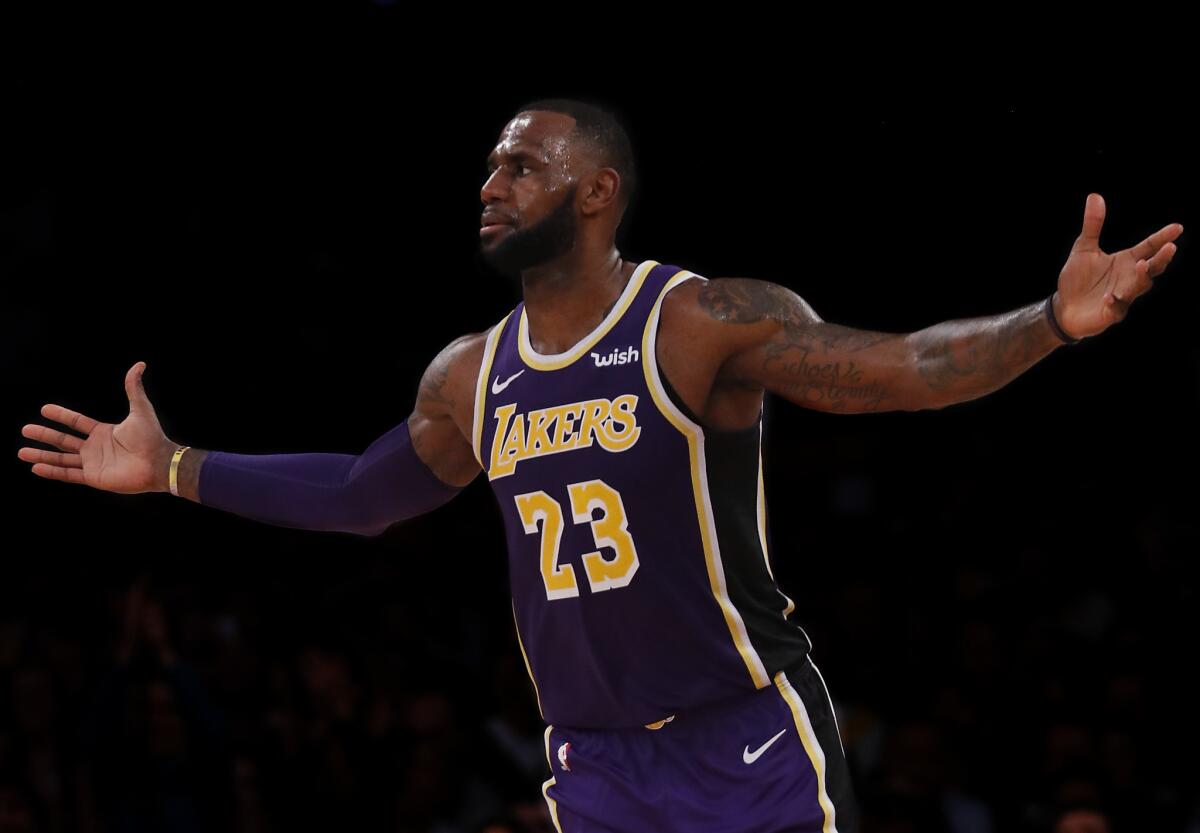
In the months before his decision to join the Lakers, James’ camp made it clear to anyone who asked that James was already an entertainment mogul, and that he didn’t need to live in Los Angeles full time to make that happen.
Besides, they said, James lives in Brentwood in the summer, and that’s when he spends the most time working on projects anyway. His decision would not be based on that.
Indeed, “Space Jam 2,” which should open in theaters in July 2021, will start filming in the summer.
James’ office at the house in Warner Village doesn’t even have a desk.
“The idea that he went to L.A. in order to pursue an entertainment career rather than trying to win another championship to me is very far-fetched,” HBO’s Nelson says.
That pursuit will have to wait at least another year. This year the Lakers will miss the playoffs for the sixth consecutive year. James will miss the playoffs for the first time since 2005.
This is a passion project for James and over and over again he’ll say that it doesn’t detract from basketball. Many of SpringHill’s projects have been in the works for years, and that they are being realized now doesn’t indicate any increased activity from James.
That doesn’t mean he doesn’t love being part of this world.
“It’s been fun, it’s been tough though,” James says. “Everybody always sees when the articles come out, LeBron and SpringHill, Maverick Carter, producing this. But we don’t always get some of the stories that we would like. Sometimes we get outbid. Sometimes the production is not gonna happen. There’s a lot of pitfalls that come with running a production company, with running a studio as well. We want to just continue to get better and better.”
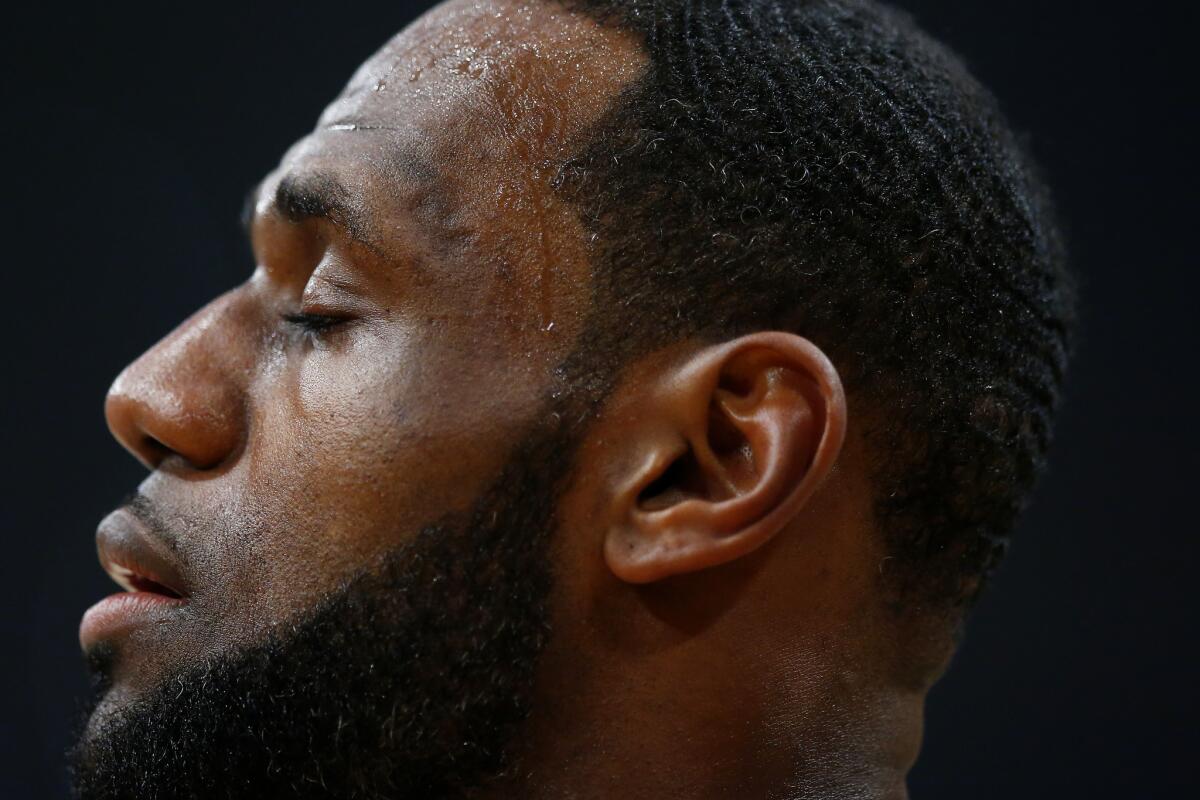
Sign up for our Lakers newsletter »
Follow Tania Ganguli on Twitter @taniaganguli
More to Read
Only good movies
Get the Indie Focus newsletter, Mark Olsen's weekly guide to the world of cinema.
You may occasionally receive promotional content from the Los Angeles Times.
